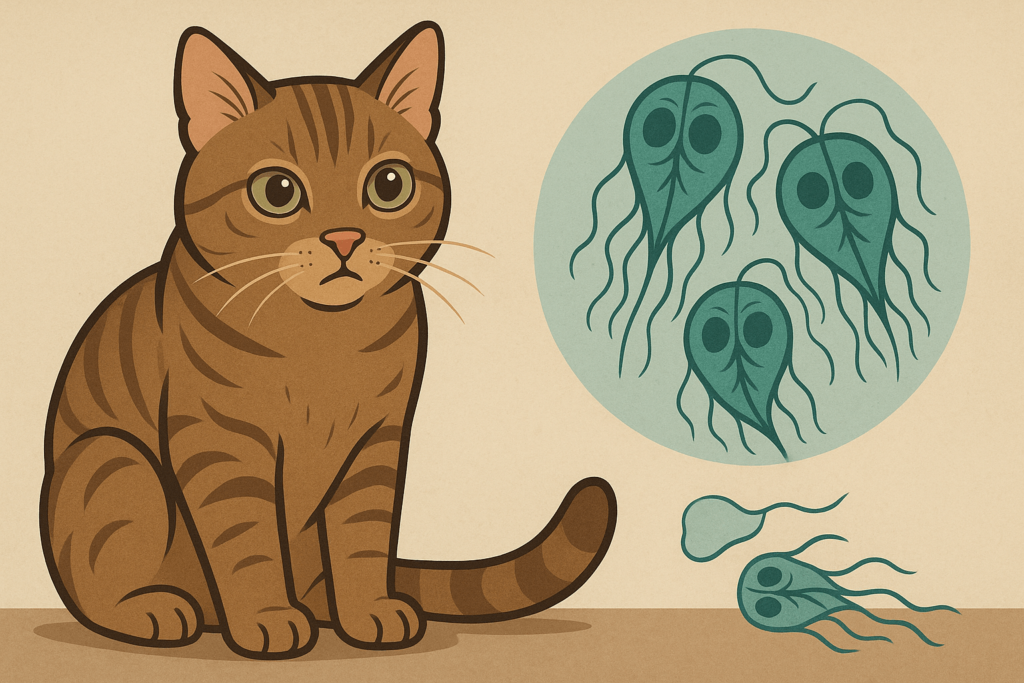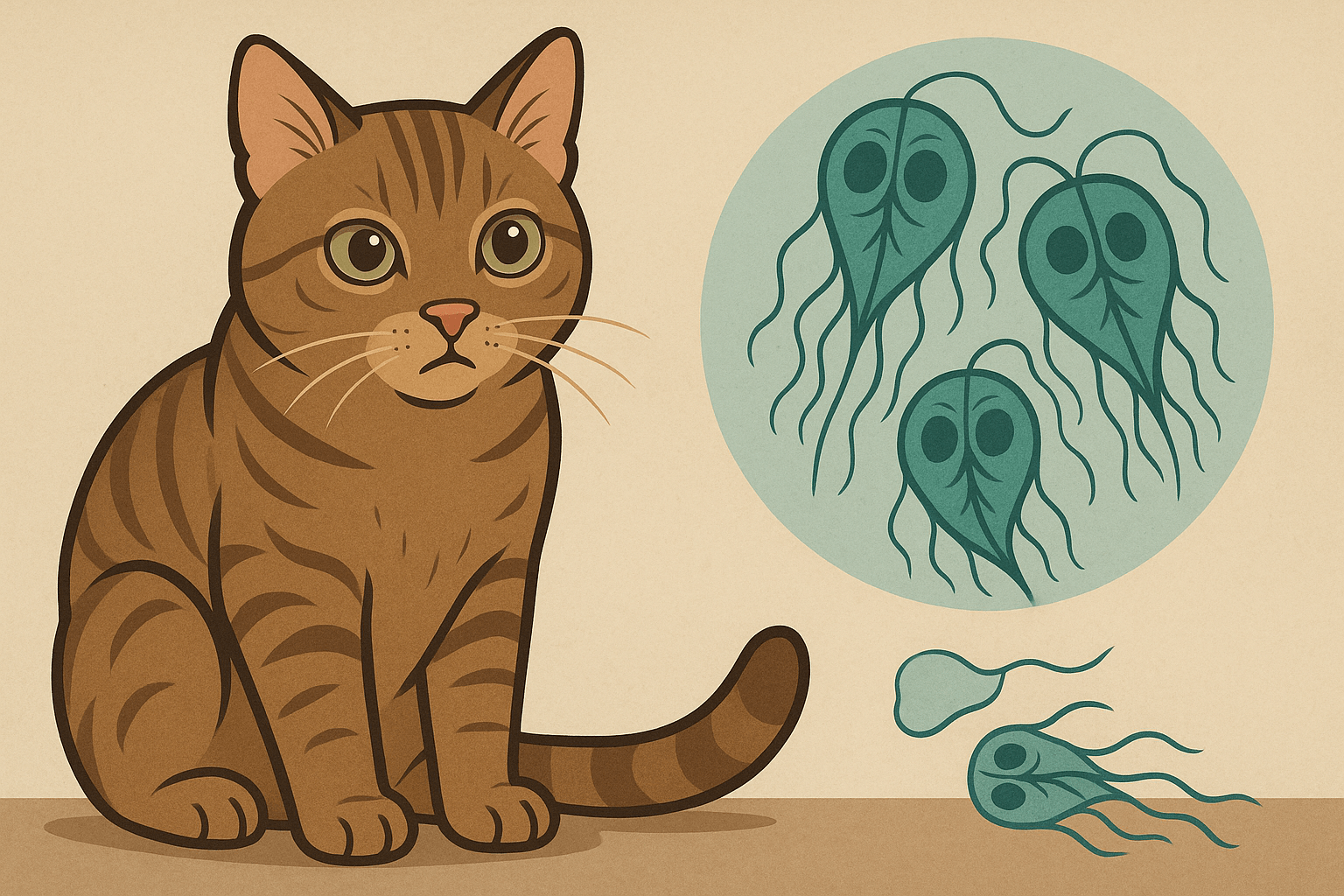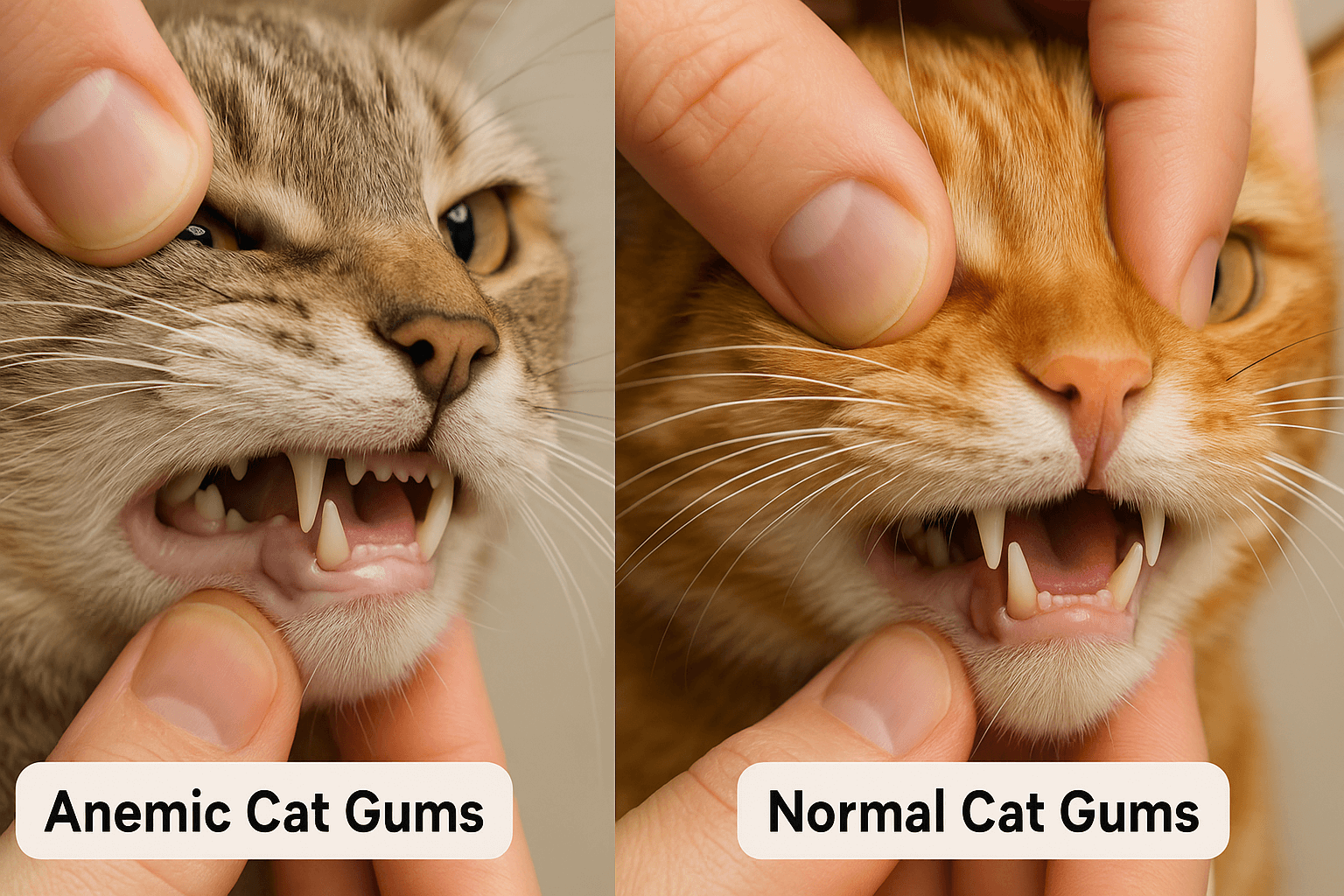Giardia in Cats: Understanding the Parasite and Its Impact
Giardia is a microscopic parasite that can infect cats, causing gastrointestinal distress and discomfort. While it’s more commonly associated with humans or dogs, giardia in cats is a concern that every pet owner should be aware of. This tiny organism can lead to diarrhea, dehydration, and other symptoms that affect your cat’s overall health and well-being. Understanding how giardia spreads, how to identify its signs, and what steps to take for treatment and prevention is crucial for keeping your feline friend healthy. In this blog post, we’ll explore everything you need to know about giardia in cats, from diagnosis to care, ensuring you’re equipped to handle this condition effectively.
What Is Giardia and How Does It Affect Cats?
Giardia is a single-celled parasite that thrives in the intestines of infected animals, including cats. While some cats may carry giardia without showing symptoms, others can experience significant discomfort. Here’s what you need to know about this parasite and its effects on feline health.
What Is Giardia?
Giardia is a protozoan parasite that causes giardiasis, an intestinal infection that disrupts nutrient absorption and leads to digestive issues.How Do Cats Get Infected?
Cats typically contract giardia by ingesting contaminated water, food, or feces. Outdoor cats and those in multi-cat households are at higher risk.Symptoms of Giardia in Cats:
Common signs include chronic diarrhea (often watery and foul-smelling), weight loss, lethargy, and occasional vomiting.Impact on Kittens and Senior Cats:
Young kittens and older cats are more vulnerable to severe symptoms due to weaker immune systems, making prompt treatment essential.Zoonotic Potential:
While rare, giardia can sometimes spread from cats to humans, particularly through improper hygiene after handling infected pets.
Understanding these basics helps you recognize the risks and take proactive measures to protect your cat and household.

Diagnosing Giardia in Cats: What to Expect
If you suspect your cat has giardia, a proper diagnosis is key to effective treatment. Veterinarians use specific methods to confirm the presence of this parasite.
Fecal Testing:
A fecal sample is examined under a microscope to detect giardia cysts, though they can sometimes be missed due to intermittent shedding.ELISA Test:
The enzyme-linked immunosorbent assay (ELISA) test is a highly accurate method for detecting giardia antigens in a cat’s stool.Observing Symptoms:
Persistent diarrhea, especially in multi-cat homes, often prompts veterinarians to test for giardia as part of their diagnostic process.Ruling Out Other Conditions:
Similar symptoms can result from other parasites or infections, so veterinarians may perform additional tests to rule out alternative causes.Importance of Early Diagnosis:
Identifying giardia early prevents complications like dehydration and malnutrition, which can worsen if left untreated.
A thorough diagnosis ensures your cat receives the appropriate care and treatment for giardia.
Check this guide 👉Worms in Cat Diarrhea: Best 7 Expert Tips!
Check this guide 👉Cat Diarrhea Treatment: Best 7 Expert Tips!
Check this guide 👉Cat Yellow Diarrhea: Best 7 Expert Tips!
Preventing Giardia in Cats | Treating Giardia in Cats |
|---|---|
Keep litter boxes clean and sanitized | Administer prescribed medications |
Provide fresh, uncontaminated water | Rehydrate your cat if dehydrated |
Avoid exposure to contaminated areas | Monitor stool samples for improvement |
Limit contact with unfamiliar animals | Follow up with your veterinarian |
Wash hands after handling your cat | Maintain a stress-free recovery period |
Treatment Options for Giardia in Cats
Once diagnosed, treating giardia involves a combination of medication, supportive care, and environmental management. Here’s what you can expect during the treatment process.
Antiparasitic Medications:
Drugs like metronidazole or fenbendazole are commonly prescribed to eliminate the giardia parasite from your cat’s system.Probiotics for Gut Health:
Probiotics help restore the balance of beneficial bacteria in the gut, aiding digestion and speeding recovery.Hydration Support:
Cats suffering from dehydration may require subcutaneous fluids administered by a veterinarian to replenish lost electrolytes.Dietary Adjustments:
Feeding easily digestible food can reduce strain on the digestive system while your cat recovers.Environmental Cleaning:
Thoroughly disinfect your home, including litter boxes and bedding, to prevent reinfection or spread to other pets.
With proper treatment and care, most cats recover fully from giardia within a few weeks.
Preventing Giardia in Multi-Cat Households
In households with multiple cats, preventing the spread of giardia requires extra diligence. These tips will help safeguard all your feline companions.
Separate Infected Cats Temporarily:
Isolate any infected cats to minimize the risk of transmission to healthy ones.Clean Litter Boxes Frequently:
Scoop litter boxes daily and disinfect them weekly to remove potential sources of contamination.Provide Individual Food and Water Bowls:
Avoid sharing bowls between cats to reduce the chance of spreading the parasite.Practice Good Hygiene:
Wash your hands thoroughly after handling infected cats or cleaning their living spaces.Regular Vet Check-Ups:
Schedule routine wellness exams to catch any potential issues before they escalate.
By implementing these preventive measures, you can maintain a safe and healthy environment for all your cats.
Additional Tips for Managing Diarrhea in Cats
Diarrhea caused by giardia can be uncomfortable for your cat and concerning for you. Managing this symptom effectively supports your cat’s recovery and overall comfort.
Offer Bland Foods:
Serve boiled chicken or plain pumpkin mixed with rice to soothe your cat’s upset stomach.Ensure Constant Access to Fresh Water:
Dehydration is a serious concern with diarrhea; encourage your cat to drink frequently.Monitor Stool Consistency:
Track changes in your cat’s stool to share with your vet, as this provides valuable insight into recovery progress.Avoid Over-the-Counter Remedies:
Human medications can harm cats; always consult your vet before trying new treatments.Create a Stress-Free Environment:
Minimize stressors, such as loud noises or sudden changes, to help your cat heal faster.
By addressing diarrhea thoughtfully, you can ease your cat’s discomfort and speed up recovery.
Signs Your Cat May Be Improving
As your cat undergoes treatment for giardia, certain signs indicate they’re on the path to recovery. Look for these positive changes to gauge progress.
Improved Appetite:
A return to normal eating habits shows your cat is feeling better and regaining strength.Firmer Stools:
Less frequent and firmer bowel movements signal that the infection is subsiding.Increased Energy Levels:
If your cat becomes more active and playful, it’s a good sign their body is healing.Weight Stabilization:
Halting or reversing weight loss reflects improved nutrient absorption and overall health.Reduced Lethargy:
Alertness and engagement suggest your cat is overcoming the fatigue caused by giardia.
These indicators reassure you that treatment is working and your cat is moving toward full recovery.
Long-Term Care After Giardia Recovery
Even after successful treatment, ongoing care is vital to prevent giardia recurrence and maintain your cat’s health. These long-term strategies ensure lasting wellness.
Schedule Regular Vet Visits:
Routine check-ups allow your vet to monitor your cat’s health and catch any issues early.Maintain a Clean Living Space:
Regularly sanitize your home, focusing on areas where your cat spends time, to eliminate lingering parasites.Boost Your Cat’s Immune System:
Provide a balanced diet rich in nutrients and consider supplements to strengthen their defenses.Limit Exposure to High-Risk Environments:
Avoid areas with stagnant water or high concentrations of animals to reduce reinfection risks.Educate Yourself on Feline Health:
Stay informed about common illnesses and preventive measures to better care for your cat in the future.
By prioritizing long-term care, you can safeguard your cat’s health and enjoy many happy years together.
Frequently Asked Questions About Giardia in Cats
Can giardia in cats be cured?
Yes, giardia is treatable with antiparasitic medications and proper care. Most cats recover fully with timely intervention.
Is giardia contagious to humans?
While rare, certain strains of giardia can infect humans. Practicing good hygiene minimizes this risk.
How long does treatment for giardia last?
Treatment typically lasts 5–10 days, depending on the severity of the infection and your vet’s recommendations.
Can I prevent giardia in outdoor cats?
Limiting access to stagnant water and contaminated environments reduces the likelihood of infection.
Should I test my other pets if one has giardia?
Yes, testing other pets helps identify asymptomatic carriers and prevents further spread of the parasite.
Staying Vigilant Against Giardia in Cats
Giardia in cats may seem daunting, but with awareness, proper care, and preventive measures, you can keep your furry companion healthy and happy. Recognizing the symptoms, seeking timely veterinary care, and maintaining a clean environment are essential steps in combating this pesky parasite. Remember, your vigilance not only protects your cat but also ensures the safety of your entire household. By staying informed and proactive, you can navigate giardia confidently and ensure your cat enjoys a long, vibrant life free from intestinal woes.
Giardia in Cats: Best 7 Expert Tips! Discover expert advice on identifying, treating, and preventing giardia in cats to ensure your feline stays happy and healthy.
Cat Hyperventilating: Best 7 Expert Tips! Discover signs, causes, and solutions for cat hyperventilation. Learn how to calm your cat and when to seek veterinary care for their breathing issues.
Anemic Cat Gums vs Normal: Best 7 Expert Tips! Learn to spot signs of anemia in cats, understand gum health, and ensure your feline stays happy and healthy with expert advice.
Himalayan Cat Size: Best 7 Expert Tips! Discover expert advice on Himalayan cat size, growth factors, care tips, and how to ensure your feline stays healthy and happy.




